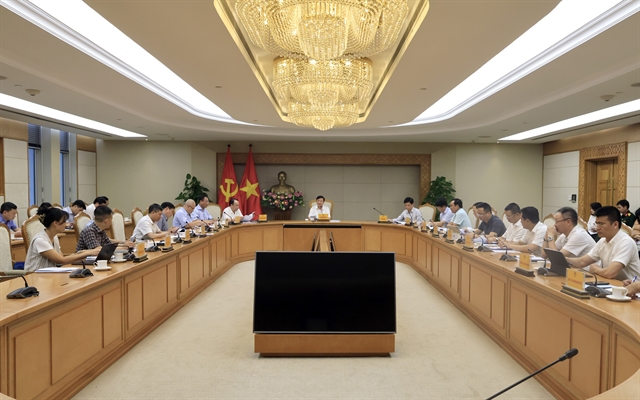 Politics & Law
Politics & Law

 |
| Deputy Prime Minister Trần Hồng Hà chairs the meeting to review the policy dossier for the draft revised Law on Civil Aviation of Việt Nam on Monday. Photo baochinhphu.vn |
HÀ NỘI — Amid new risks to aviation safety and security, Deputy Prime Minister Trần Hồng Hà has called for clear policies and mechanisms to promote public investment in technologies and equipment capable of detecting and promptly addressing unauthorised flying objects intruding into airport airspace.
He made the request on Monday while chairing the meeting to review the policy dossier for the draft revised Law on Civil Aviation of Việt Nam, aimed at institutionalising the Party’s guidelines and the Government’s directives, while aligning with international treaties and the latest standards and recommendations of the International Civil Aviation Organization (ICAO).
The Deputy PM stressed that the dossier must clarify three key aspects. These include the substantive incorporation of feedback, adherence to the principles of decentralisation and delegation of authority, and comprehensive updates on aviation security and safety policies in the new context.
According to Uông Việt Dũng, Director of the Civil Aviation Authority of Việt Nam, based on a review of the current law, ICAO recommendations and emerging development needs, the drafting body has proposed five main policy groups for revision.
The draft law aims to improve the legal framework for aviation administration by clarifying the legal status and roles of aviation authorities and aviation security authorities, while also promoting the development of the aviation industry.
It also seeks to enhance aviation safety policies in line with the eight key elements of safety oversight systems recommended by the ICAO.
The draft proposes updating and supplementing aviation security policies, recognising aviation security as an integral part of national security, with the establishment of a dedicated structure and an independent investigative mechanism.
It also calls for the revision of investment and airport operation policies, particularly for dual-use airports that serve both civil and defence-security purposes, and for the strengthening of public-private partnership (PPP) mechanisms.
Finally, the draft also focuses on promoting the development of air transport through measures such as providing incentives for cargo carriers, improving service quality, and clarifying the responsibilities of airlines.
Additionally, the Ministry of Construction proposed expanding the law’s scope to cover unmanned aerial vehicles (drones) and air taxis, to reflect technological trends and facilitate pilot programmes for new models.
The ministry also suggested scrapping outdated airspace zoning plans, avoiding detailed regulation of administrative procedures and government agency responsibilities within the law itself, and leaving these to sub-law documents to ensure flexibility and practical implementation.
At the meeting, Deputy PM Hà emphasised that the new mechanisms and policies should aim to create breakthroughs, resolve bottlenecks and pave the way for a modern, globally integrated aviation sector.
He urged the drafting body to incorporate feedback, finalise the dossier, specify which provisions need to be codified in law and reasonably delegate regulatory authority to the Government.
Agreeing with the proposal to separate aviation security and safety into distinct policy groups, the Deputy PM called for aviation security provisions covering drones used in civil aviation, either through codification or pilot schemes. He also urged updates to safety regulations for modern aerial vehicles used in healthcare, commerce and air taxi services.
He stressed that the revised law must definitively address land use and defence-security asset management at dual-use airports to prevent overlaps among aviation, land and defence laws. Clear rules are needed to define public-private roles in airport infrastructure investment, operation and management, ensuring transparency and avoiding duplication.
The drafting body should also review policies on competition, slot allocation and operating rights to ensure fairness between state-owned and private airlines, he added.
Regarding international commitments, especially with the ICAO, the Deputy PM demanded that agreed provisions, particularly those concerning administrative structures and functions of aviation regulators, be incorporated into the law.
He also called for the addition of environmental protection and sustainable development policies, such as updating the CO₂ emissions reduction roadmap, fully participating in the Carbon Offsetting and Reduction Scheme for International Aviation (CORSIA) and encouraging the use of sustainable aviation fuels (SAF).
Finally, he proposed that the policy for developing the aviation industry be made a separate, standalone section with a clear roadmap, as this is a new sector with significant potential. The law should lay the foundation for gradually building domestic capacity in manufacturing, maintenance, and development of aviation equipment and technical services. — VNS




